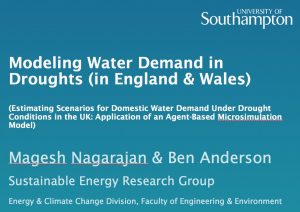Dr Ben Anderson and Dr Magesh Nagarajan have presented preliminary results from the IMPETUS project at the 2016 European meeting of the International Microsimulation Association.
The paper described their approach to modeling domestic water demand in England using a synthetic 1000 household dataset and demonstrated the results of an Agent Based Model to project water demand forwards in time in response to:
- A range of projected drought conditions
- A range of water efficiency campaigns
The results suggested that for every 0.25% increase in “dual flush” toilet uptake, the average incremental saving in water was c.55 million litres; for every 0.25% increase in “Eco shower” uptake, the average incremental saving in water was c.9 million litres and for every 10% increase in “Hosepipe Ban compliance”, the average incremental saving in water was c. 0.65 million litres.
As suggested by previous work, the results show that temporary use bans (“Hosepipe Bans”) are relatively less effective than water efficiency interventions because relatively few people have gardens that they actively water.
